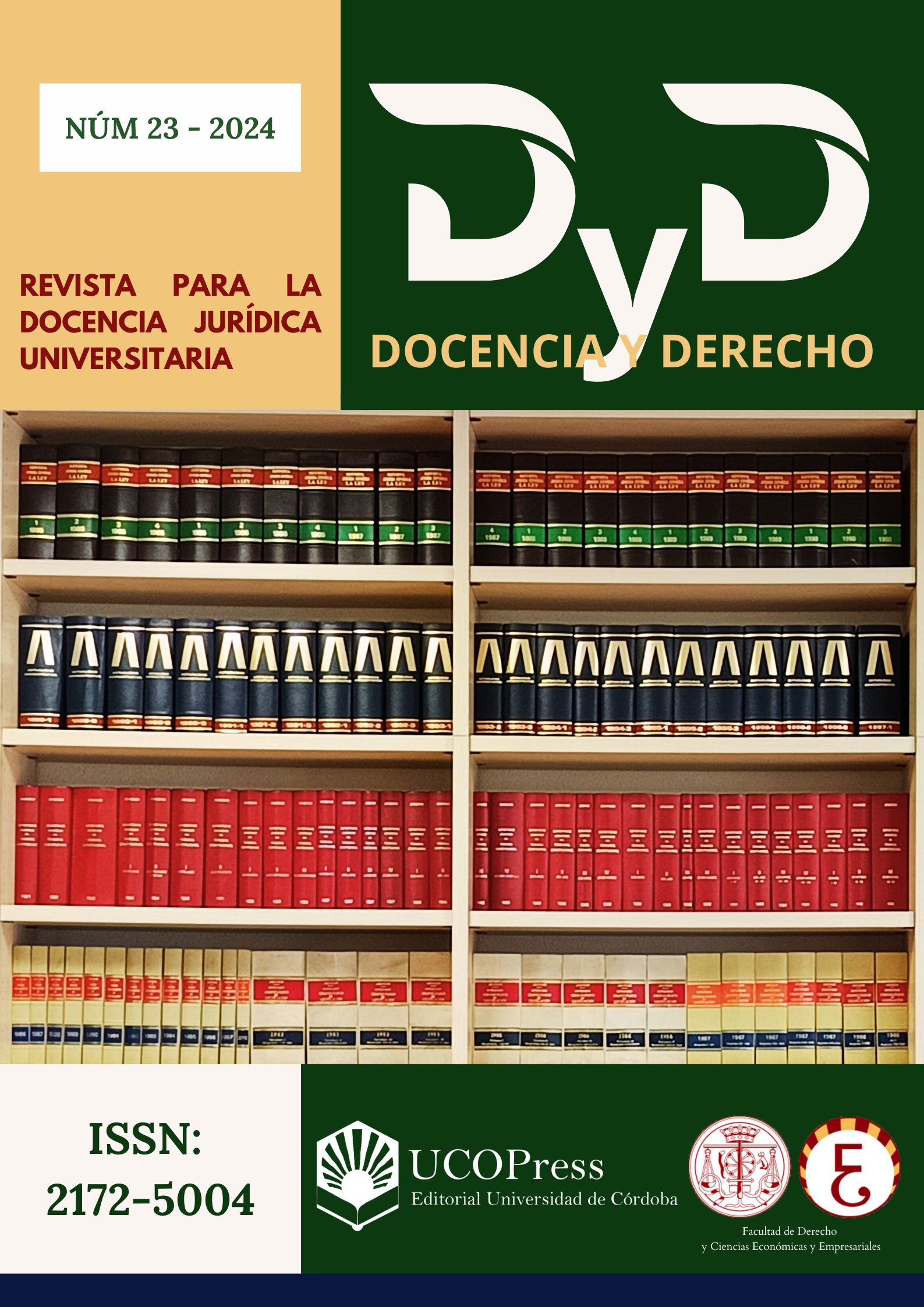The Organic Law of the University System and teaching innovation: special reference to the social economy
DOI:
https://doi.org/10.21071/redd.vi23.17420Keywords:
university system, corporate law, social economy, teaching innovationAbstract
This work aims to expose a legal circumstance to which university education is faced, which is innovation and the possibility that said teaching innovation can be seen specifically in the corporate type that makes up the framework of the social economy. Within the scope of commercial law, the social economy is viewed as a collective formula for social organization to achieve, through common effort and resources, solutions that cannot be achieved individually and it is the resulting organization that must assume the positive consequences. and negative aspects of the risks that their actions in the economic sphere generate. With this, and the university legislation of pertinent application, it is confirmed that teaching innovation becomes an essential content in the work of universities and therefore in the work of teachers, so that it is configured in a fundamental strategy of the universities, the centers and the coordination of the degrees, and this keeping in mind that the essential objective of the educational process is to teach and learn without losing sight of the fact that this work must adapt to the social, economic, technological and cultural changes that are taking place. develop in each historical moment. With the proposal that we make in this work, teaching innovation and the values of the social economy, through the proposal of a teaching project that incorporates them, it is becoming evident that universities, by transforming their ways of learning and teaching, adapt to the demands of societies in constant change. Thus, i.- the legal framework of the social economy is exposed without losing sight of the regulations of the Autonomous Community of the Canary Islands in this area; ii.- the direct relationship between the regulation of the Spanish university system and the social economy with iii.- an innovative proposal reflected in the teaching project of the subject Company Law corresponding to the field of commercial law
Downloads
Publication Facts
Reviewer profiles N/A
Author statements
Indexed in
-
—
- Academic society
- N/A
References
-ALFONSO SÁNCHEZ, R.; “La economía social desde la tipología societaria”, Revista de Derecho de Sociedades, nº.47, 2016.
- “Algunas consideraciones en torno a la Propuesta de Ley «marco» de Economía Social”, REVESCO nº.102. 2010.
-BAREA TEJIRO, J., PULIDO ÁLVAREZ, A.; "El sector de Instituciones sin fines de lucro en España", Revista de Economía pública, Social y Cooperativa, nº.37, 2001.
-BROSETA PONT, M. y MARTÍNEZ SANZ, F.; Manual de Derecho mercantil, volumen 1, decimosexta edición, Madrid, 2009.
-CATANIA, J. y CELAYA IBARRA, A.; “La Economía Social en el diálogo social. Constitución Española y perspectivas”, Revista de Economía Pública, Social y Cooperativa, noviembre 2003.
-CUERVO-CAZURRA, A., DOZ, Y., y GAUR, A.: “Skepticism of Globalization and Global Strategy: Increasing Regulations and Countervailing Strategies”, Global Strategy Journal, vol. 10, nº. 1, 2020. DOI: https://doi.org/10.1002/gsj.1374
-CHAVES ÁVILA, R., MONZÓN CAMPOS, J. L.; "Economía social y sector no lucrativo: actualidad científica y perspectivas", Revista de Economía pública, Social y Cooperativa, nº.37.
-DOMÍNGUEZ CABRERA, M. P.; “El marco regulador de identificación de las empresas y entidades de la economía social: especial referencia a la comunidad autónoma de canarias”, CIRIEC - España. Revista jurídica de economía social y cooperativa, nº.45, 2024 (aceptado por la Revista y pendiente de publicación). DOI: https://doi.org/10.7203/CIRIEC-JUR.45.27356
-DOMÍNGUEZ CABRERA, M. P., GALVÁN SÁNCHEZ, I.; “La innovación docente desde la educación en los valores de la economía social”, Docencia y Derecho, nº.14, 2019.
-FERNÁNDEZ DE LA GÁNDARA, L.; “Problemas actuales del Derecho de sociedades”, Revista de Derecho Mercantil, 1971.
-GARCÍA FERNÁNDEZ, E. C., y DELTELL ESCOLAR, L.; “La Guía Docente: un reto en el nuevo modelo de educación universitaria/Syllabus (Guía Docente): a Challange in the New Model Education at University Level”, Estudios sobre el mensaje periodístico, vol. 18, 2012. DOI: https://doi.org/10.5209/rev_ESMP.2012.v18.40989
-GARGALLO CASTEL, A., PÉREZ SANZ, J.; “El papel de las tecnologías de la información y la comunicación en las empresas de economía social”, Revista de Estudios Cooperativos, nº.97, primer cuatrimestre 2009.
-GARRIGUES, J.; “Teoría general de las sociedades mercantiles”, Revista de Derecho mercantil, nº.142, 1976.
-JARNE MUÑOZ, P.; “La libertad de cátedra y el papel de la guía docente en la Universidad derivada del Espacio Europeo de Educación Superior”, Revista Educación, Política y Sociedad, nº.49, vol. 2, 2019. DOI: https://doi.org/10.15366/reps2019.4.2.006
-JIMÉNEZ SÁNCHEZ, G. J.; Lecciones de Derecho mercantil, (coordinador), decimotercera edición, Madrid, 2009.
-LOJENDIO OSBORNE, I., GÓMEZ PORRÚA, J. M.; “La sociedad anónima y la sociedad comanditaria por acciones” en JIMÉNEZ SÁNCHEZ, G. J; Lecciones de Derecho mercantil, (coordinador), decimotercera edición, Madrid, 2009.
-MARCELO GARCÍA, C., ESTEBARANZ GARCÍA, A., MAYOR RUIZ, C. M., MINGORANCE DÍAZ, P., PARRILLA LATAS, Á., y SÁNCHEZ MORENO, M. R.; “El proyecto docente”, en Materiales para la Enseñanza Universitaria, 1997.
-MONREAL GIMENO, C.; “Las guías docentes como instrumento de innovación en la enseñanza superior en el marco de la convergencia europea. Education siglo XXI”, Revista de la Facultad de Educación, vol. 23, 2005.
-PALOMO ZURDO, R.; “Educación, una encrucijada de retos y competencias en la era digital”, (2022) (en línea) https://blogs.elconfidencial.com/alma-corazon-vida/tribuna/2022-06-03/educacion-retos-era-digital_3433455/ (consulta: 01/06/2024)
-SENENT VIDAL, M- J. y FAJARDO GARCÍA, I. G.; “Aspectos relevantes de la investigación jurídica en economía social”, Revista de Economía Pública, Social y Cooperativa, nº.56, 2026.
Published
How to Cite
Issue
Section
License
Copyright (c) 2025 maria del pino dominguez cabrera

This work is licensed under a Creative Commons Attribution-NonCommercial-NoDerivatives 4.0 International License.
El/la autor/a que publica en esta revista está de acuerdo con los términos siguientes:
- El/la autor/a conserva los derechos de autoría y otorga a la revista el derecho de primera publicación de la obra
- Los textos se difundirán con la licencia de reconocimiento de Creative Commons que permite compartir la obra con terceros, siempre que éstos reconozcan su autoría, su publicación inicial en esta revista y las condiciones de la licencia.



